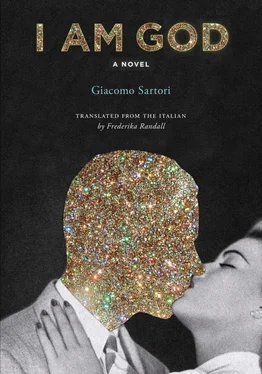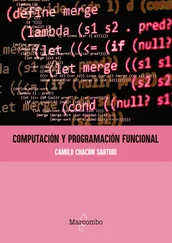Daphne had spent the whole day previously, Sunday, at the lab, as well as all night. Twenty-three hours straight with only two breaks for three chocolate bignè and a bag of peperoncino-flavored potato chips that she’d found on the shelf of the pimpled chemist who wants to marry her and have ten kids. Oh, and three packets of candied ginger. When she got to the meeting place in front of the Greek herbalist’s and caught sight of the little one’s doe eyes and gum-colored gums, all her fatigue slipped away like a heavy overcoat. In the jeep belonging to the Museum of Science, she let herself be rocked back and forth by the roll of the curving road, and her mood gradually turned better and better, as if she’d just gotten up.
Still clutching the viper-necktie, Aphra, the small one (I’m getting mildly tired of calling her small), kneels on the ground. With her free hand she gets her equipment out of the knapsack and lays it out neatly on a flat stone. A half-smile lingering on her finely drawn lips, she makes an incision with her scalpel in the skin behind the viper’s head, lifts the tiny flap and inserts a small electronic chip. She then carefully disinfects the wound and applies a bandage two fingers wide. The bandage will fall off in a while, it’s done on purpose , she says in that voice as clear as water, putting the viper on the ground. For an instant it is motionless, then slowly slinks off, like a patient who’s been to the doctor and needs a moment to review what was said.
Daphne’s now a little frightened. What if another horned viper—this rock pile seems to be full of them—suddenly appears and bites her on the ankle above her motorcycle boots? Something could go wrong. Perhaps because she sees her brow furrow, Aphra tells her it’s almost impossible to get bitten by a viper; the cows Daphne has to deal with are far more dangerous. The wee one’s calm is contagious and Daphne’s doubts disperse like clouds racing across the sky, and disappear. Human premonitions do have a way of disappearing like that, even the accurate ones.
Leaning against a comfortable branch in a stand of larches by the side of the stone heap, Daphne observes Aphra. Her sensuous cat’s body (only her head is a doe’s) obviously needs to hunt this way, it’s a genuine vocation for her. The horned viper is at risk of extinction and she’s studying it to determine how to help save it. Watching her move, she thinks her friend is right about animal life: you have to take nature as it comes. She, instead, has always been thinking about how to modify nature, how to work out its secrets, put it on a leash, and exploit it. This new idea is slow to advance, a cart with rusty wheels, but she promises herself she’ll think about it. For the moment, she’s fine with this silence, with the sun that’s dusting the crowns of the larch trees. Then she thinks of nothing, because she falls asleep. And sleeps like an angel (angels don’t sleep, but whatever).
As they drive down toward the plain with its blotches of asphalt and concrete, Aphra says she can’t bear working at the Museum of Science anymore. All they want to do is organize idiotic exhibits. Like everything else, the natural sciences are slaves to the dictatorship of the free market and the ignorance of the masses. They’ll use the excuse of the recession not to hire her, they’ll never give her a full-time job; she’s too much of a troublemaker. But fine, she doesn’t want to be complicit with a system that’s driving the human race to the brink of catastrophe. She wants to farm, grow carrots and cabbages with her own hands, raise a goat and some chickens, and if possible a donkey. The time has come to organize a real resistance.
Daphne is taken aback. She’s always lived in the city and can’t imagine settling elsewhere. She’s always believed that even the most modern agriculture is still quite backward, and must be brought up to date with technology. The wee zoologist’s ideas would ordinarily horrify her, ideas so similar to the wishful thinking practiced by her mother’s friend and his buddies, with their gray hair and their weakness for red wine and marijuana. And yet, when she thinks of growing carrots in semifeudal conditions, she nearly bursts into tears. She has no idea why, and she makes sure the other doesn’t see her.
On their way back into town, the short one tells her she’s decided to leave Vittorio. She waited for him to behave better; she’s been patient, but now she’s fed up. She hasn’t told him yet, but she will soon, she says with gay resolve, in that tone of voice you adopt when talking about your vacation plans. Anyway, sex with him was never that great, she says, hammering in the last nail. Daphne says nothing, although she wouldn’t mind talking about her two–zeros and her three–zeros, and the one–zero. Always zero. The lump in her throat has returned, and so she gazes out the side window.
THINKING OF NOTHING AGAIN
It’s not that I’m neglecting the other seven billion humans, God knows, but as will happen when one’s preoccupied, I listen to them with one ear while trying to work out the problem at hand. I’ve never played any favorites, and honestly I’m not thrilled about starting at this venerable age. So I make an effort to do things properly, and safeguard my scrupulous, exemplary professionalism. If an old fellow is taking a long time to die, for example, I don’t deliver him on the spot, as I’d be tempted to do, I let his throes go on for as long as it takes.
As soon as I can, I turn my attention back to what interests me most now (in the heat of the moment, I was about to write the only thing ). I watch her at work in the laboratory, her white smock open over that slightly coarse skin, a blonde’s skin; I watch her while she’s on the toilet defecating, the blind cat on her knees; while she sleeps. I love to watch her sleep: stretched out between the sheets without the serious, thick glasses, abandoned to sleep’s slightly damp and sensuous heat, her innocent sexuality smelling almost of bread, or yeast. She reminds me of one of those very long angels in certain Mannerist paintings, announcing some arrival or other, or floating on the ceiling of a church. When she’s sleeping I don’t fear her committing acts that offend me, and there’s no danger she’ll masturbate. She dreams, and I love following her optimist’s dreams, fresh as the water from a brook (Petrarchan?) with continual surprises and plot twists.
It’s when I watch her sleep that the craziest fantasies come to me. My friend (that’s how I think of her in private) could become a goddess, I think. I could raise her to divine standing; that’s something the immortals (fanciful figures beloved by the Greeks, thought to have eternal life) used to do all the time. She could become my consort. Common-law wife, concubine, whatever you like; freed, you understand, from having to expire—a fix that technically speaking is a snap. Instead of running around stealing crucifixes or stuffing herself with Sicilian cannoli, she’d be by my side, or trekking around the galaxies. She’d fit in fine: I can easily imagine her here, her and those pigtails. Instead of microbes, she’d study meteorite fragments, or some cosmic scientific enigma. There’s material enough to nourish her mathematical soul for eternity, and slowly her knowledge would surpass mine (as it were). At some point she might decide to set down a giant summary bible, a compendium that would be admired to the end of time. I would no longer be alone, we’d be a couple, a pair of gods.
The present ritual foresees that God has a son, a descendant, but no consort, or companion or whatever, but you know what, the monotheistic religions would simply have to get over it . [33] One more proof humans are intrinsically selfish; I see no reason why they should spend their days coupling, or thinking about coupling, while I may not even take a legitimate wife.
And I may be worrying too much; the doctrine regarding me has always been quite vague and approximate, so that married or not married wouldn’t change much. Besides, there would be no need to broadcast the news to the four winds, we could just carry on discreetly for the moment. Slowly humans would begin to sniff out the fact that I was no longer alone, and then they’d have to catch up, bring the sacred texts up to date, redo the iconography and all. Taking their time.
Читать дальше












